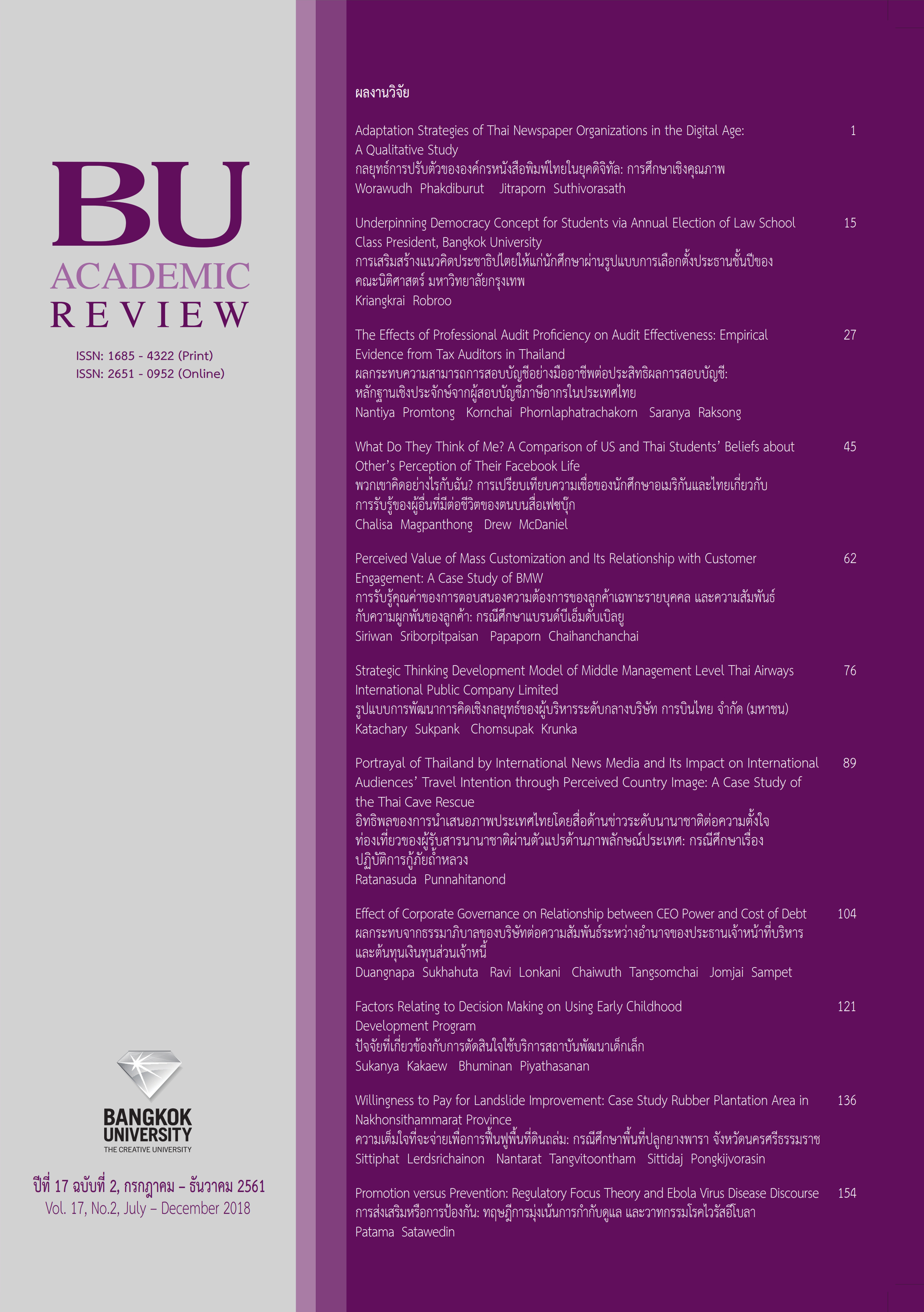Perceived Value of Mass Customization and Its Relationship with Customer Engagement: A Case Study of BMW
Main Article Content
Abstract
The objectives of this survey research were 1) to study the perceived value of mass customization and customer engagement, and 2) to study the relationship between the perceived value of mass customization and customer engagement. A self-administered questionnaire was distributed to collect data from 200 BMW customers who are males and females, aged between 25 to 55 years old. The findings showed that the perceived value of mass customization achieved a good level. That is, the sampling mostly agreed that their own BMW cars can truly reflect their self-identity (M=3.86). In terms of customer engagement, it also achieved a good level; the sampling mostly agreed that driving a BMW car makes them proud (M=4.00). The results also indicated that perceived value of mass customization was positively correlated with customer engagement at a high level (r=64). In addition, perceived value of mass-customized product was more positively correlated with customer engagement than perceived value of mass customization experience or co-design process.
Article Details
The manuscript submitted for publication must be the original version, submitted only to this particular journal with no prior acceptance for publication elsewhere in other academic journals. The manuscript must also not violate the copyright issue by means of plagiarism.
References
2. ตถาตา รุ่งกระจ่าง. (2559). ประสบการณ์ลูกค้าของสมาชิกแสตมป์ไทยที่มีความสัมพันธ์กับความภักดีต่อตราสินค้า บริษัท ไปรษณีย์ไทย จำกัด. วารสารปัญญาภิวัฒน์, 8(1), 67.
3. Avey, B., & Avolio, J. (2009). Psychological ownership: Theoretical extensions measurement and relation to work outcomes. Journal of Organizational Behavior, 30(2), 173-191.
4. Berman, B. (2002). Should your firm adopt a mass customization strategy?. Business Horizons, 45(4), 51-60.
5. BMW Blog. (2017). Urban driving experience challenge. Retrieved from https://www.bmwblog.com/tag/urban-driving-experience-challenge.
6. Bonson, P. E., Carvajal, T. E., & Escobar, R. T. (2014). Influence of trust and perceived value on the intention to purchase travel online: Integrating the effects of assurance on trust antecedents. Tourism Management, 47, 286-302.
7. Desmet, P., & Hekkert, P. (2007). Framework of product experience. International Journal of Design, 1(1), 57-66.
8. Duray, R. P. T., Ward, G. W., Milligan & W. L., Berry. (2000). Approaches to mass customization: Configurations and empirical validation. Journal of Operation Management, 18(6), 605-625.
9. Franke, N., & Piller F. T. (2004). Value creation by toolkits for user innovation and design: The case of the watch market. Journal of Product Innovation Management, 21(6), 401-415.
10. Khan, A., & Haasis, H. D. (2016). Producer-buyer interaction under mass customization: Analysis through automotive industry. Logistics Research, 9(1), 17.
11. Kim, J., Suh, E., & Hwang, H. (2003). A study on customer centric model to evaluate the effectiveness of CRM. Pohang university of science and technology, Department of electrical and computer engineering. Journal of interactive Marketing, 17(2), 5-19.
12. Lamberti, L. (2013). Customer centricity: The construct and the operational antecedents. Journal of Strategic Marketing, 21(7), 588-612.
13. Marketing Science Institute. (2006). 2006-2008 Research Priorities: A Guide to MSI Research Programs and Procedures, Cambridge, MA. (2010), 2010-2012 Research Priorities, Cambridge, MA. Journal of the Academy of Marketing Science, 32 (1), 3-19.
14. Merle, A., Chandon, J. L., Roux, E., & Alizon, F. (2010). Perceived value of the mass-customized product and mass customization experience for individual consumers. Production and Operations Management, 19(5), 503-514.
15. Michelli, A. (2015). Driven to delight: Delivering world-class customer experience the Mercedes-Benz way. Wall Street Journal. Retrieved from
www.driventodelight.com.
16. Moliner, M. A., Sanchez, J., Rodriguez, R. M., & Callarisa, L. (2007). Relationship quality with a travel agency: The influence of the post-purchase perceived value of a tourism package. Tourism and Hospitality Research, 7(3/4),194-211.
17. Parasuraman, A. (1997). Reflection on gaining competitive advantage through costumer value. Journal of Academy of Marketing Science, 25(2), 154-164.
18. Pine, J. (2004). Mass customization: The new imperative. Strategic Direction, 20(1), 2.
19. Rust, R. T., & Oliver, R. L. (1994). Service quality: Insights and managerial implications from the frontier. New York: Sage.
20. Sheth, J. N., Sisodia, R. S., & Sharma, A. (2000). The antecedents and consequences of customer-centric marketing. Journal of the Academy of Marketing Science, 28(1), 55-66.
21. Süphan, N. (2015). Customer relationship management strategies in the digital era. Istanbul University, Turkey. A volume in the Advances in Marketing, Customer. Relationship Management and E-Services.
22. Vivek, S. D., Beatty, S. E., & Morgan, R. M. (2012). Customer engagement: Exploring customer relationships beyond purchase. Journal of Marketing Theory and Practice, 20(2), 122-146.
23. Wang, Y., Lo, H. P., & Yang, Y. (2004). An integrated framework for service quality, customer value, satisfaction: Evidence from China's telecommunication industry. Information Systems Frontiers, 6(4), 325-340.
24. Woodruff, R. B. (1997). Customer value: The next source for competitive advantage. Journal of the Academy of Marketing Science, 25(2), 139-153.
25. Yoo, M., & Park J. (2016). The effect of value co-creation of mass customization on consumer responses. Journal of E-Business Studis, 18(1), 37-49.
26. Zeithaml, V. A. (1988). Consumer perceptions of price, quality, and value: A means-end model and synthesis of evidence. Journal of Marketing, 52(3).


